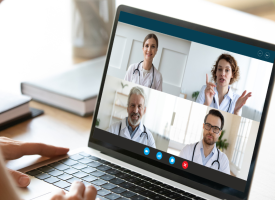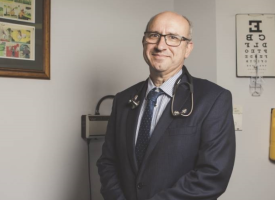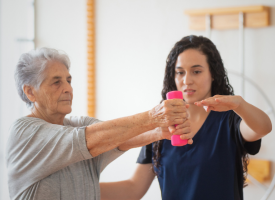Dr Tony Bartone - ABC Radio Adelaide - Online Doctor Services
Transcript: AMA Vice President Dr Toby Bartone, ABC Radio Adelaide, 6 April 2017
Subjects: Online Doctor Services
JULES SCHILLER: Would you feel comfortable going on Skype, talking to a doctor online? Or do you might think that they miss some important things? One man that we should talk to especially about this is the AMA Vice President, Dr Tony Bartone. Hi Tony.
TONY BARTONE: Good afternoon, Jules.
JULES SCHILLER: Now, we've heard about the digital medical hub, especially as I was saying at the intro, with the NBN where medicine will be conducted online. What do you think about these types of services springing up, is it good or bad?
TONY BARTONE: Look, there's no doubt that digital health and digital platforms will play an increasing role in the delivery of health care in the future. However, I feel that really, in this situation, it's a situation where this is best served where there's a pre-existing relationship between the doctor and the patient. That allows that awareness, that understanding of the patient's background, the patient's history, the patient's other issues that are in play, and in terms of making that appropriate decision when you aren't able to conduct a visual or an in-person consultation.
Besides all of that, there's also the issue of the fragmentation of care. If we're delaying our presentation in terms of in person because of a simple and what might be convenient option, it sometimes may end up being more costly down the track, delaying the diagnosis, or even missed opportunities for preventative care…
JULES SCHILLER: So …
TONY BARTONE: [Interrupts] I don't - sorry to interrupt, but men in particular, we hardly ever see them in the consulting room unless their significant other makes an appointment for them, and the only other time might be when they need a medical certificate, and it might be the only opportunity we get to really start that conversation about preventive health.
JULES SCHILLER: Other health, yeah. Because doctors do ask you to take tests, you know, often when you go in there for something unrelated. So are you saying, Tony, that maybe GPs should have a Skype service as well? Like, I was talking to Aifric [Boylan, Qoctor director] about a referral letter, and you do feel a bit guilty going in there for five minutes just to get a quick referral. So are you saying that GPs should start to offer this online service to patients that they already have?
TONY BARTONE: Look, there's no doubt that, in the future, that all these modalities will come to play an increasing role where there is that ongoing relationship, as I say. But at the moment, really, it's about establishing that relationship and the life-long association with your trusted medical practitioner. When the chips are really down, people will then say ‘I need to find a doctor, I need to try and get into somewhere quick’, you know, you're going through the Yellow Pages or the internet to try and find someone that might be able to see you.
Whereas if you've already got a relationship and you've already got a treating doctor, it's so much easier, and you can quickly get in and cut across and pre-empt what might become a more significant problem.
So, it's about timeliness, it's about efficiency, it's about the best use of scarce health resources, but also trying to get ahead of the game in the future and dealing with longitudinal care.
JULES SCHILLER: I definitely think that's an important conversation to have, a relationship with a doctor, a GP, going back many years where they understand and it's a conversation about your health, rather than just a quick drop-in drop-out visit. But I guess what the health industry is up against, Tony, is the Uber generation, and taxis have experienced this, when if something is more convenient and very easy to use, you know, consumers will go there purely because of the convenience first, and perhaps even secondary to the cost. So, it does seem that GPs do have to modernise in some way to try and combat this, don't you think?
TONY BARTONE: The new digital health platforms will offer the opportunity for novel and innovative solutions, and we need to be aware of that. And we need to be responsive, and we need to be able to deliver health care to our patients in a resource-constrained environment. And, obviously, this might be one of the ways in the future that significantly gives us that opportunity to think outside of the square.
But obviously, it really comes down to a pre-existing relationship and awareness, and there's really no replacement for an examination in person. And, yes, you might say, ‘it might be a fever and that's probably just a cold’, but that could be also the first step of a more significant presentation.
And, as one of my trusted teachers from way back when always reminded me, more mistakes are made by not looking than by not knowing. So, it's really very important to conduct a proper history and, in association with that history, any examination and then subsequently confirmatory tests that might be required. And that all goes to the process and the procedure of that ongoing relationship and understanding the patient. At the end of the day, it's about performing the best possible care for the patient.
JULES SCHILLER: Best quality. Alright Tony, thank you very much for that insight. That's Dr Tony Bartone from the AMA, he's the AMA Vice President, talking about how important it is to have that face to face contact.
6 April 2017
CONTACT: Maria Hawthorne 02 6270 5478 / 0427 209 753
Follow the AMA Media on Twitter: http://twitter.com/ama_media
Follow the AMA President on Twitter: http://twitter.com/amapresident
Follow Australian Medicine on Twitter: https://twitter.com/amaausmed
Like the AMA on Facebook https://www.facebook.com/AustralianMedicalAssociation



